With the season finished it’s time to look back at the wins and how the teams fared, and also take a deeper look at the stats. Which teams had the most podium places but the fewest wins? Which teams are the most reliant on one rider?
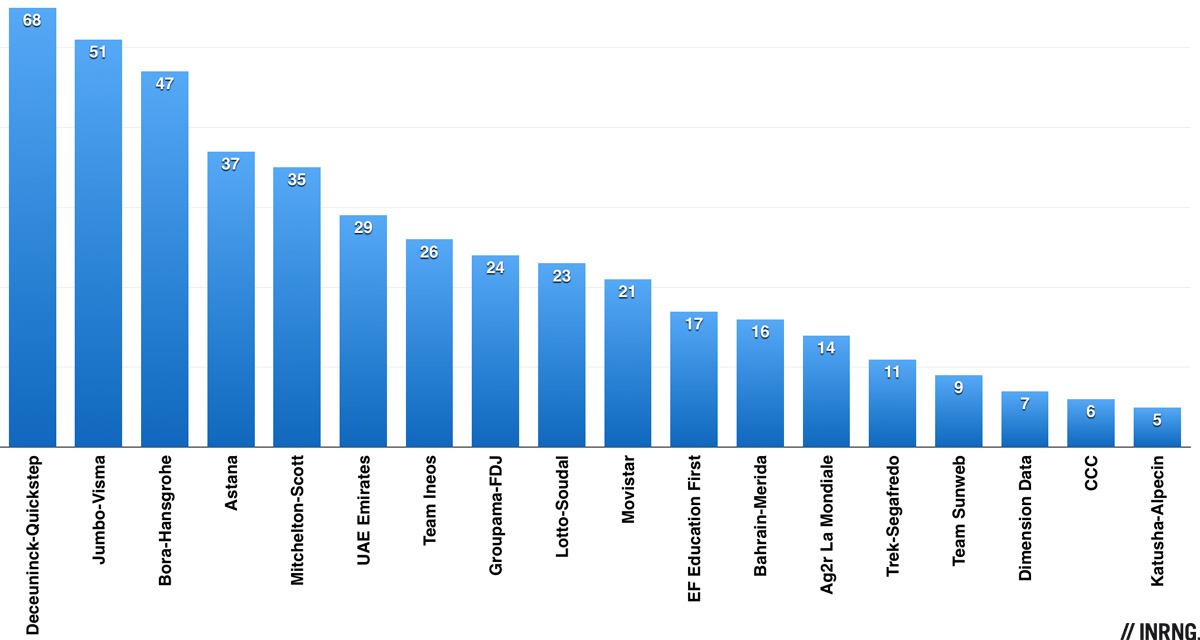
Deceuninck-Quickstep top the table again, just as they have done every year since 2012 when Team Sky topped the charts. The team’s model is established, they aim for a maximum of victories and don’t target the overall classification in the big stage races preferring stage wins along the way and live for the spring classics. They take in younger riders and if they start winning they won’t get in a bidding war to retain them although Patrick Lefevere probably made an exception for Julian Alaphilippe this year, he won the most races for them this year with 12, compared to 10 for Elia Viviani. Over half the team enjoyed a solo win in the year.
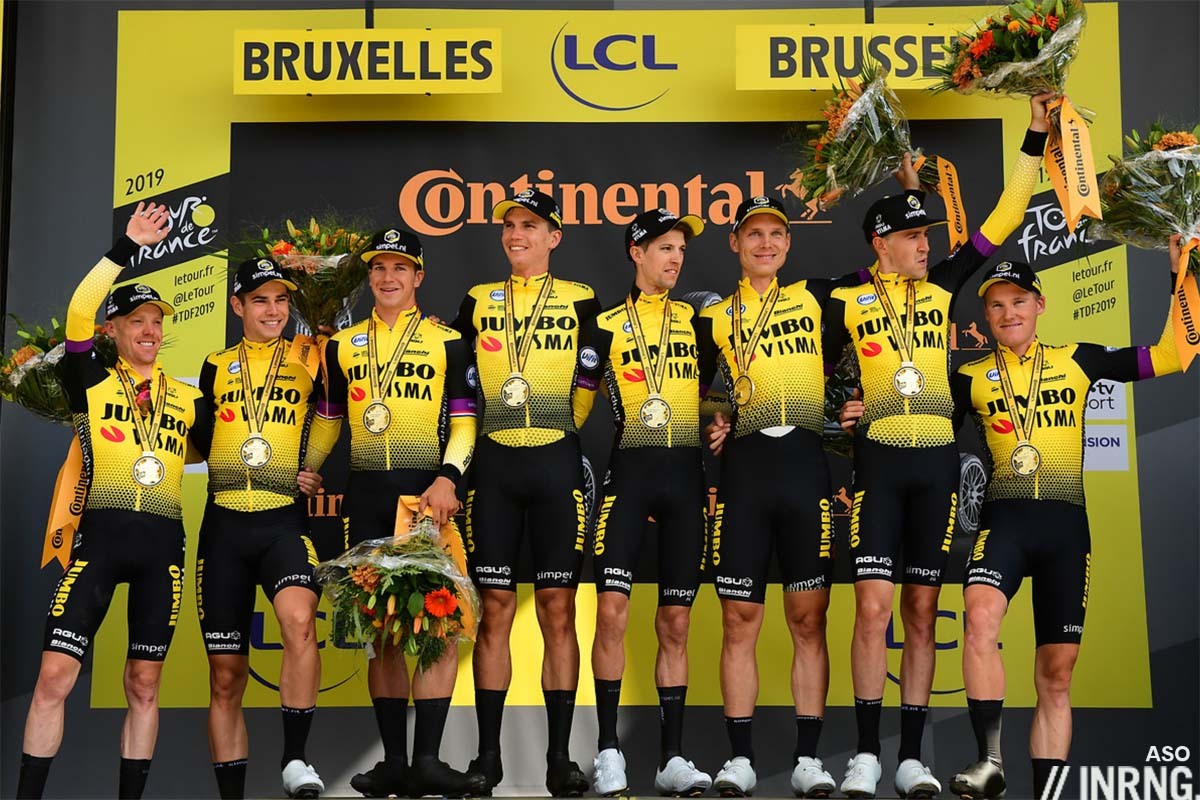
Jumbo-Visma are second and have become a team to be reckoned with, it wasn’t long ago they were riding as Team Blanco and then losing replacement sponsor Belkin all-too-quickly and even as Lotto-Jumbo they finished the 2015 season with just six wins. Dylan Groenewegen got 15 wins for them this year and Primož Roglič wasn’t far behind with 13 which is arguably the more impressive given sprinters tend to win lots while Roglič just kept on scoring in stage races throughout the year. They had a great Tour de France with Mike Teunissen winning on the opening day, the team time trial win, Wout van Aert’s stage win and guiding Steven Kruijswijk to a podium finish and also went shopping for Tom Dumoulin.
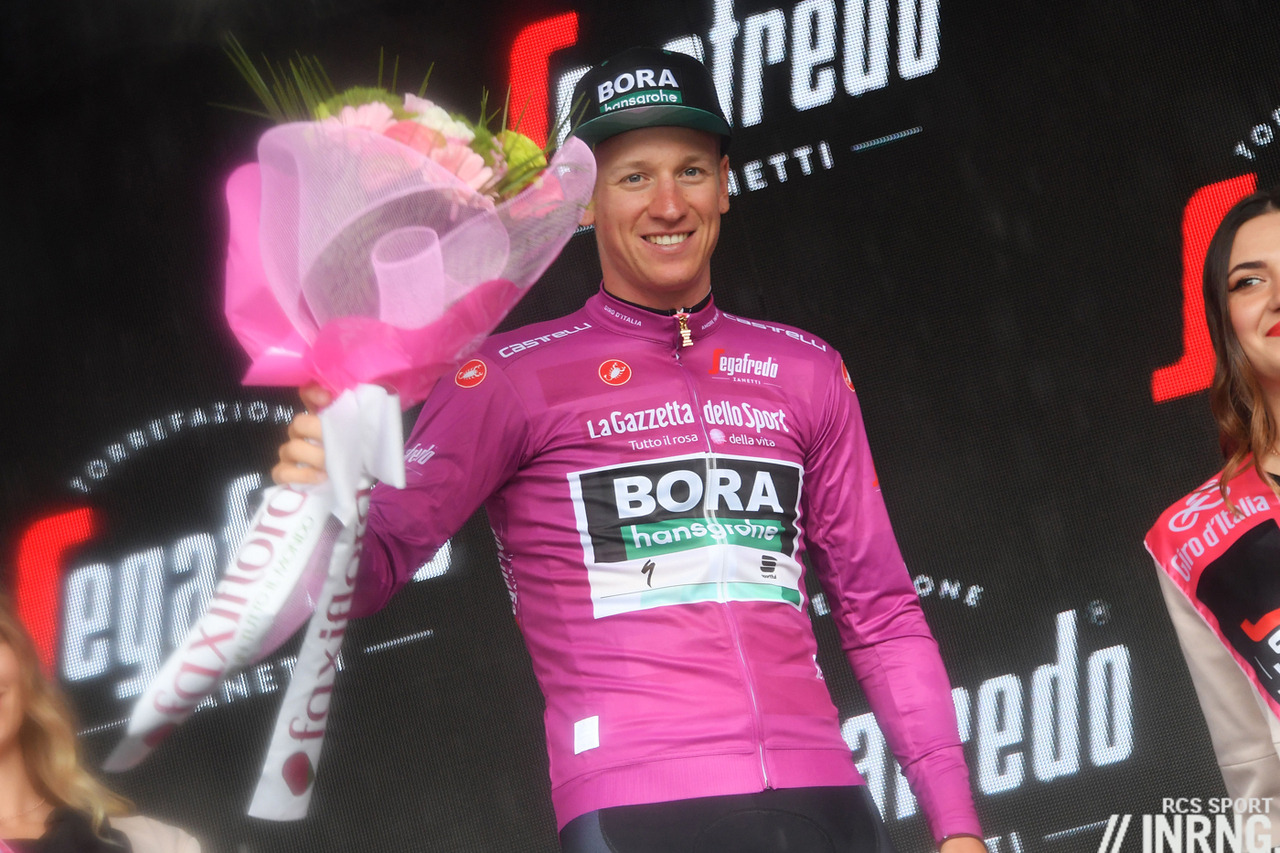
Bora-Hansgrohe have come a long way too. As NetApp-Endura and Bora-Argon 18 they were begging wildcards and then landed Peter Sagan. This looked lopsided, a Pro Conti team with Sagan and his entourage bolted on the side but now Sagan’s one of several captains. Sam Bennett was their best rider but is leaving, Pascal Ackermann is their sprint project while Max Schachmann and Emanuel Buchmann bring them stage race success and the signing of Lennard Kämna from Sunweb looks like a smart move.
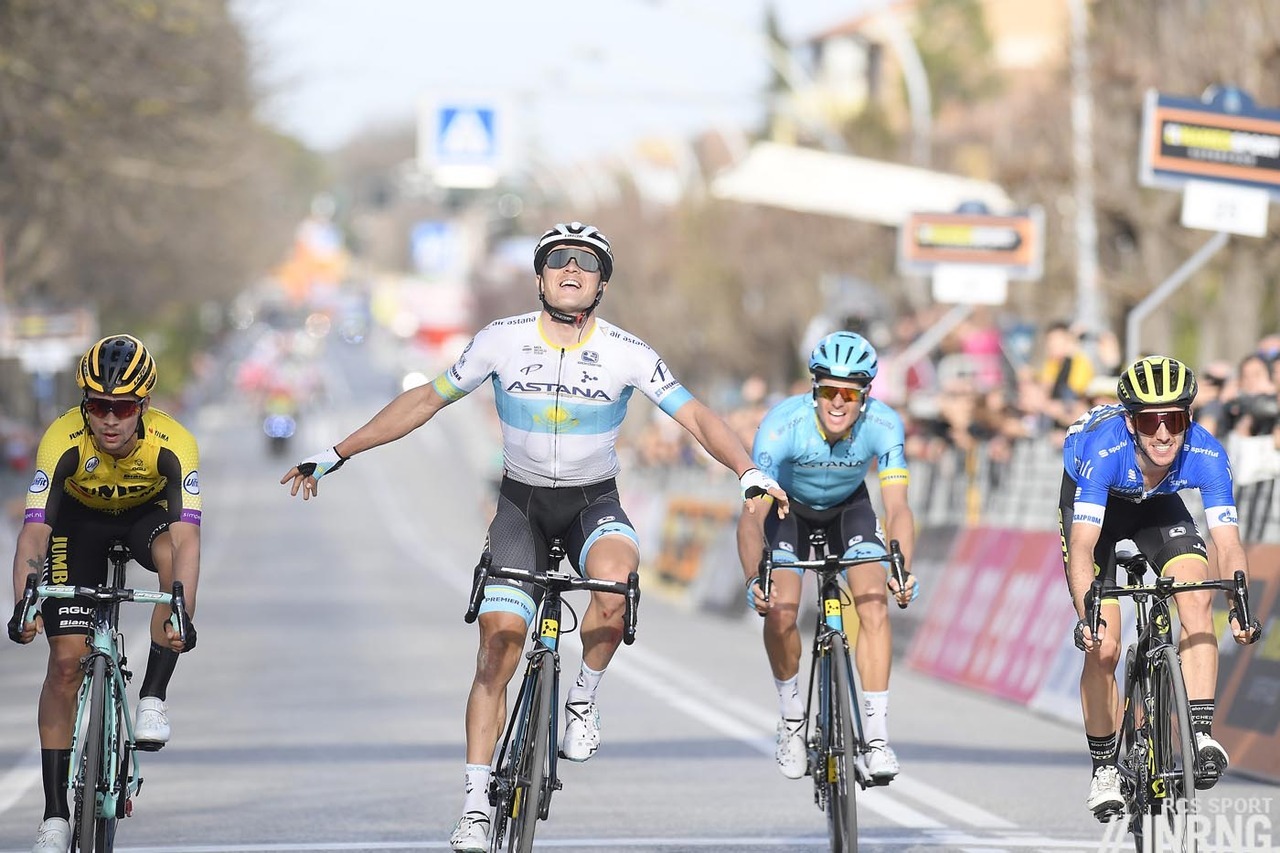
Astana are fourth after one of their best seasons. They’ve not got the budget of the days when Vincenzo Nibali was winning grand tours… or rather their budget hasn’t kept up with the rest of the teams. Jacob Fuglsang got the headlines for Liège-Bastogne-Liège, the Dauphiné and a Vuelta stage but perhaps Alexey Lutsenko’s 10 wins are more important because he’s a Kazakh on a Kazakh team which exists to promote the country and the team probably needs him more than he needs the team.
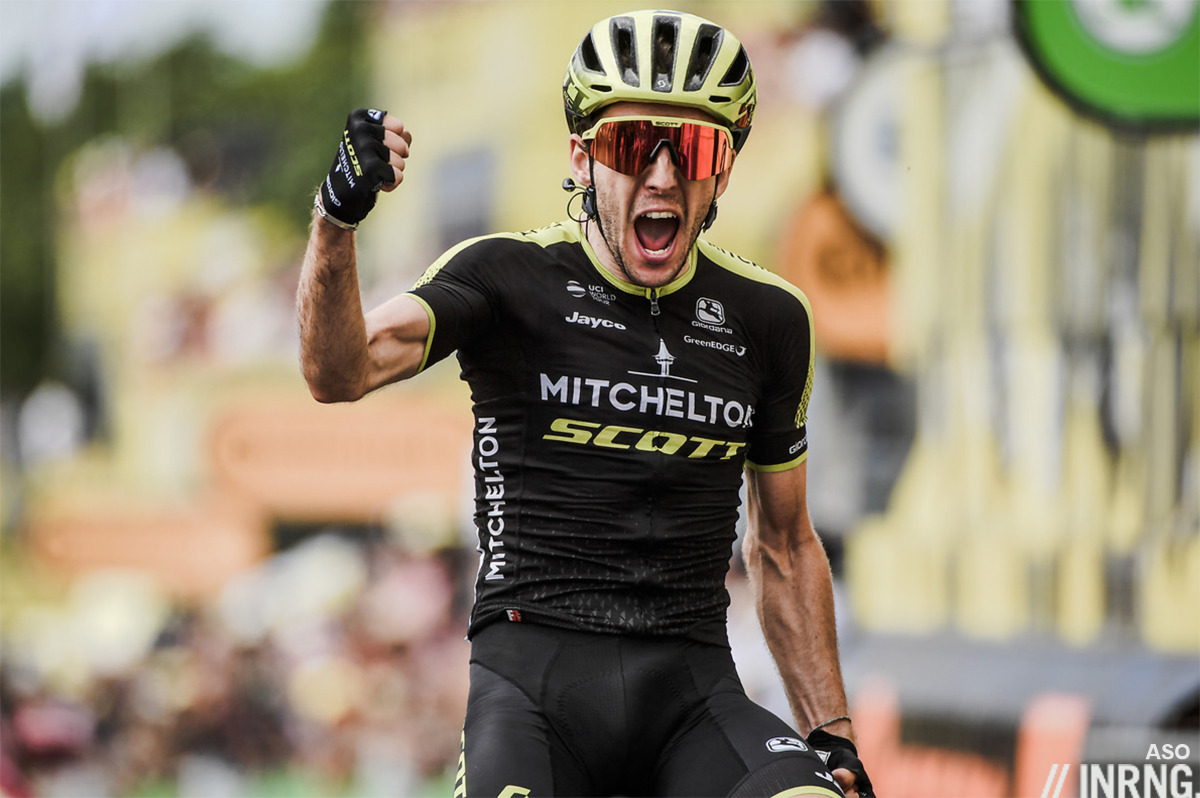
Mitchelton-Scott come next and they’ve long been towards the top of the table only they’re a different team with fewer sprinters and more of a grand tour squad so arguably they’ve done even better just to stay near the top. Simon and Adam Yates delivered several wins but not the grand tour success of 2018 but four stage wins for the team in the Tour de France is about as good as consolation gets. Their top riders for wins were Matteo Trentin and Daryl Impey with six each.
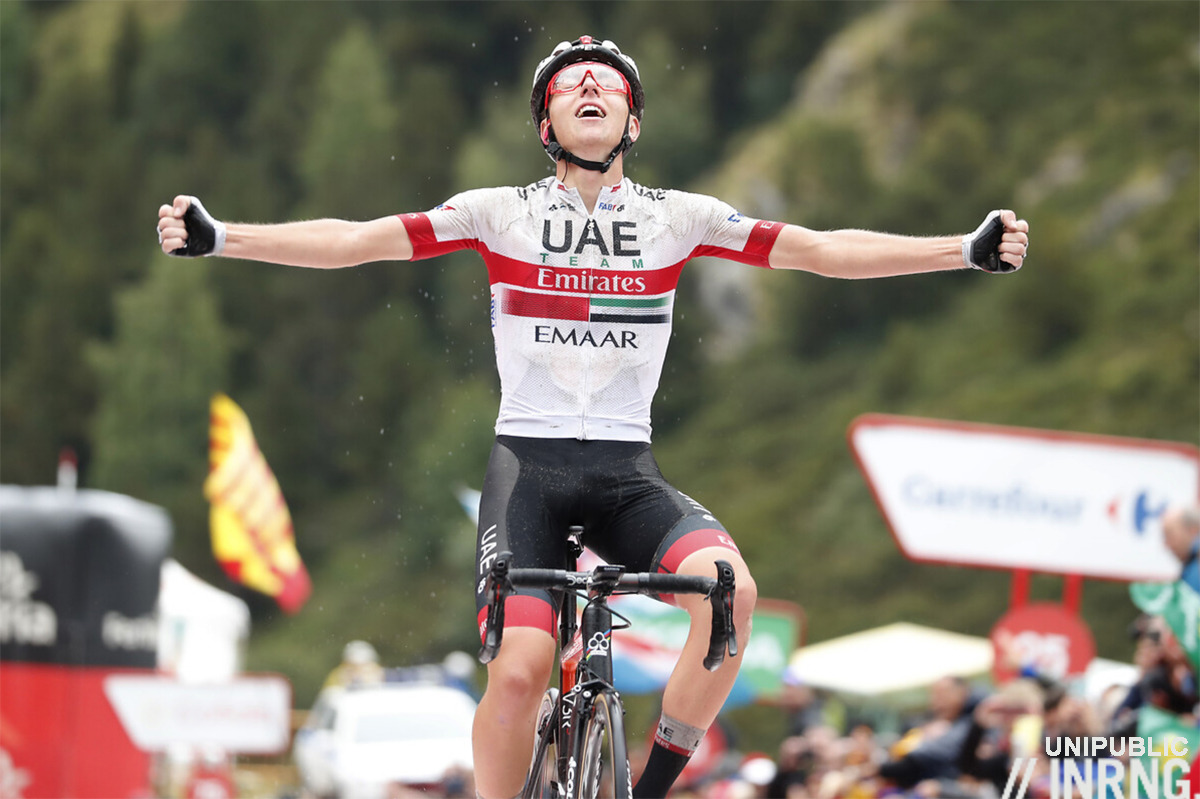
UAE-Emirates feel like a surprise in sixth place. Tadej Pogačar scored the most with eight wins, ahead of sprinters Alexander Kristoff on seven and Fernando Gaviria on six. The Colombian was a big signing but picked up a knee injury and has been chasing his tail ever since, 2020 will be a big year to see if he can get back.
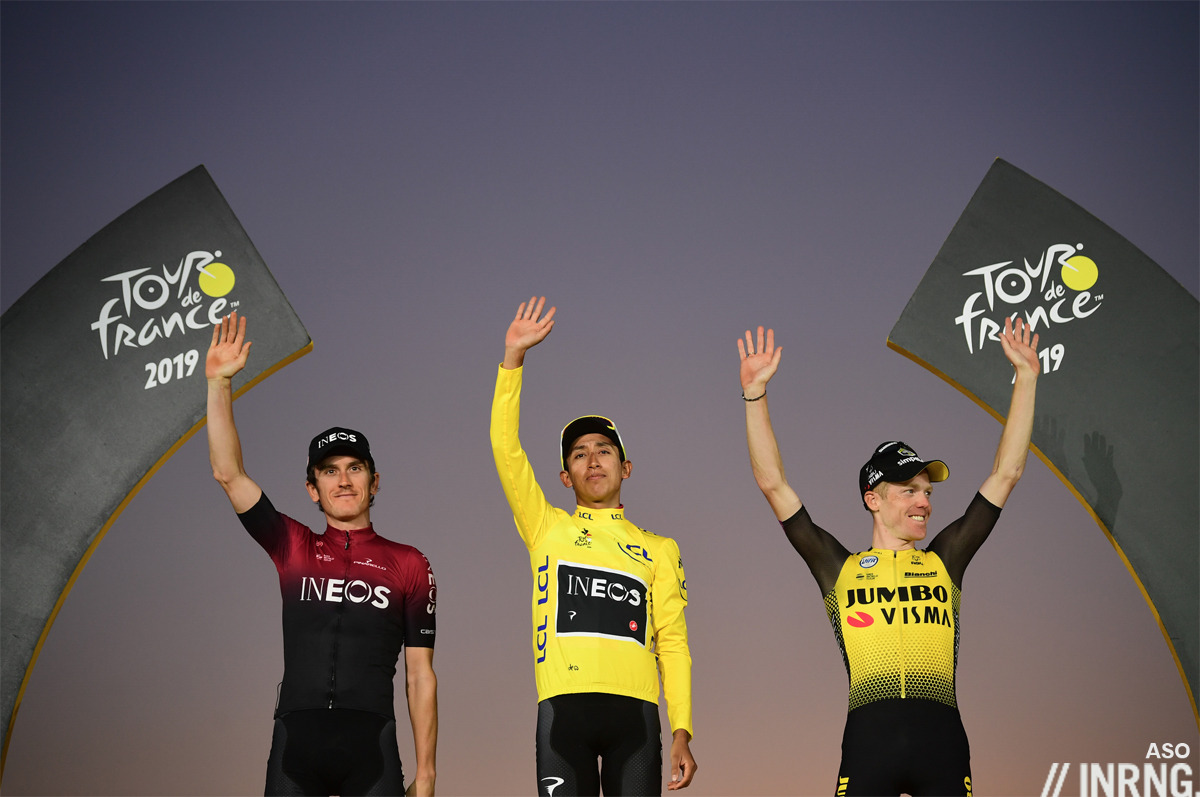
Team Ineos come next and prompt the obvious reminder about quality verus quantity, where winning the Tour de France merely counts as one win in the tables here but is worth more than everything else in the sport. Still the reduced number signals it’s not been a vintage year for the biggest budget outfit. Leader Bernal won six races but the other star riders didn’t get a win between them, not one for Michał Kwiatkowski, Geraint Thomas nor Chris Froome before his horror crash; there was a slight collective tendency to miss out on the win and land second or third places. So far the confirmed only signing for 2020 is Richard Carapaz and the goal is to win all three grand tours in one season and the method is to have two leaders starting in each to help ensure this.
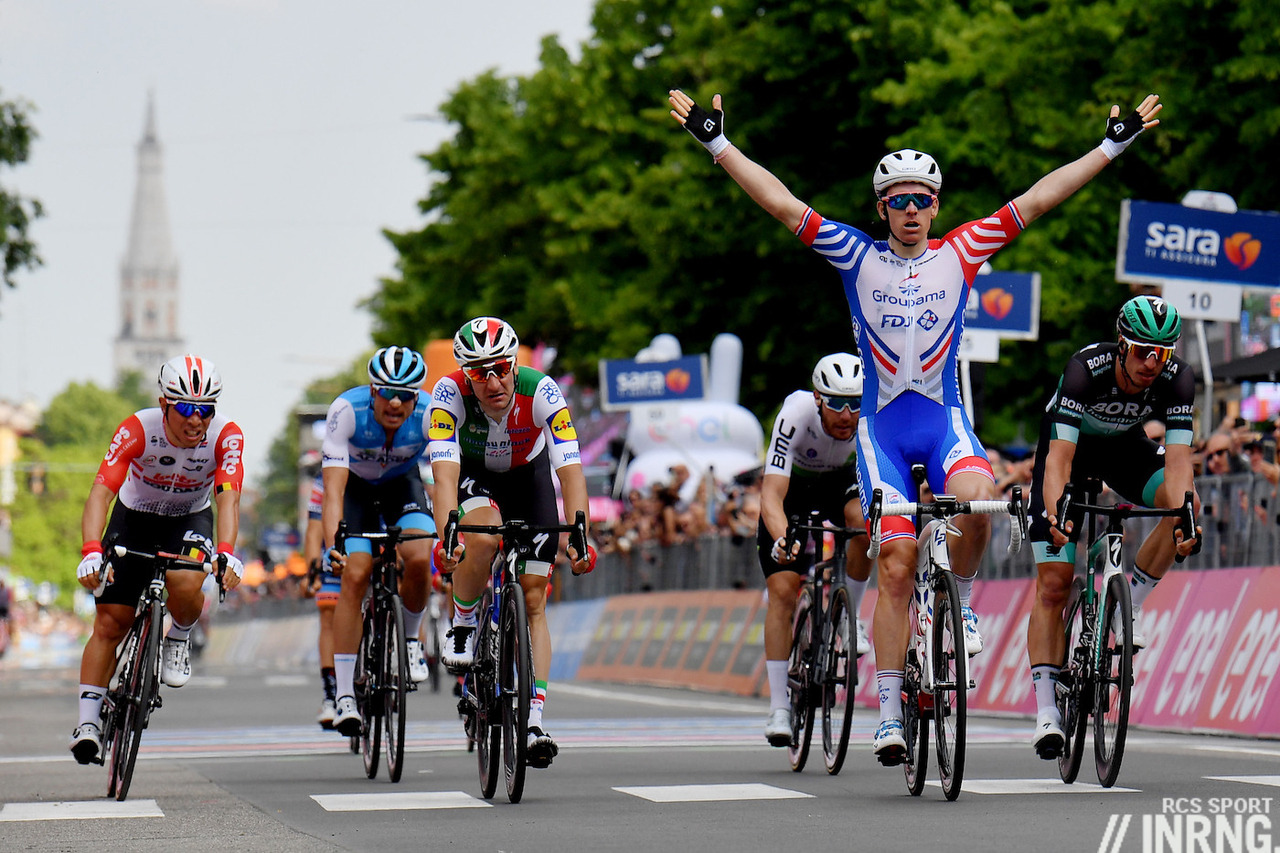
Groupama-FDJ score high with 24 wins but only four of these in the World Tour. It might suit their sponsors and their rural client base to rack up wins in smaller races around France but it’s a different tactic to, say, Mitchelton-Scott or Ineos who focus their efforts on the prime calendar. Their best rider for wins? It’s a tie between Thibaut Pinot, Marc Sarreau and Stefan Küng for five, while notional top sprinter Arnaud Démare is on three. Sarreau won the Coupe de France series but has yet to win outside of France or in the World Tour.
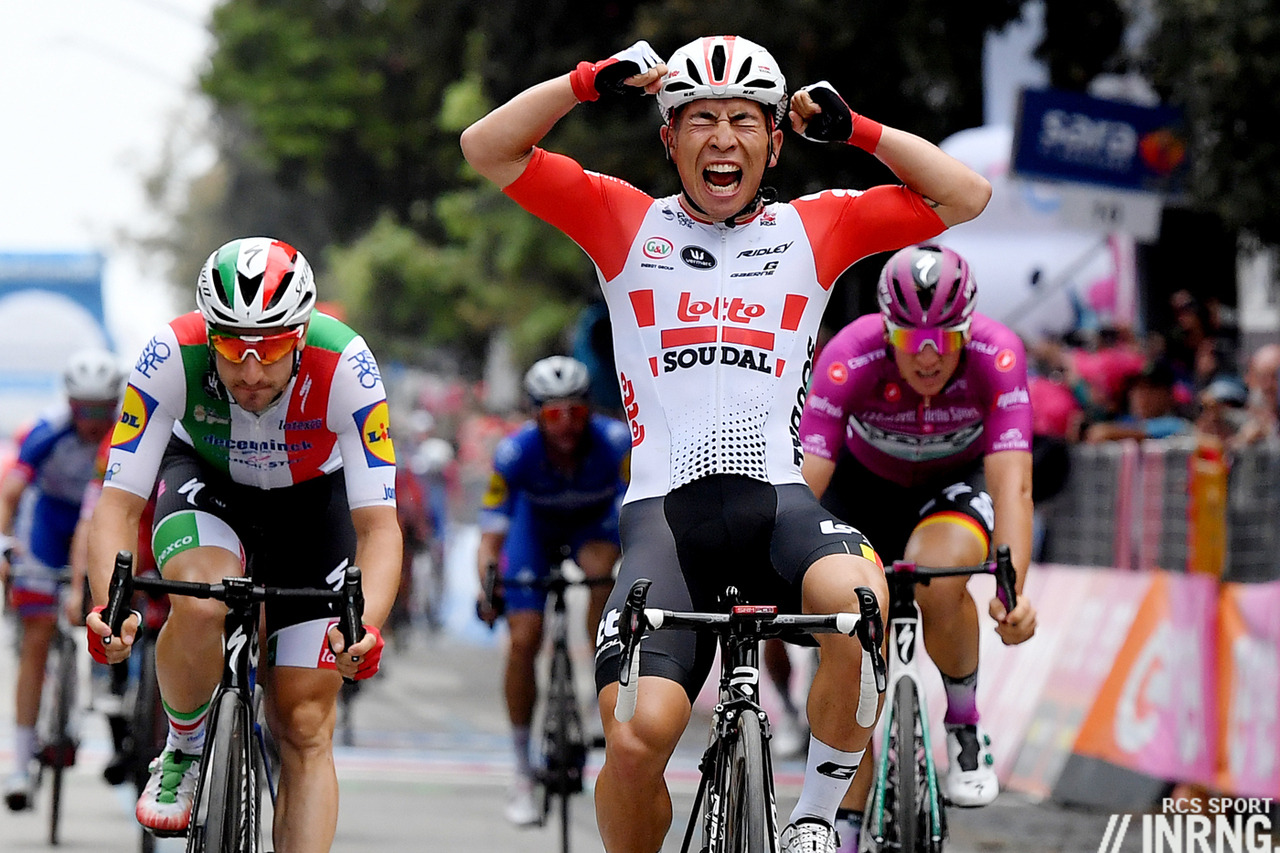
Lotto-Soudal made a big move to get Caleb Ewan and they might have been a touch nervous this spring as he didn’t get a win until the Tour of Turkey in late April. Everything fell into place with two stages in the Giro and then three in the Tour for him, plus Thomas De Gendt took a memorable breakaway win too. Perpetual underdogs to Belgian rivals Deceuninck-Quickstep they’re still chasing that big spring classics win but otherwise score well on other fronts. It’s not in the chart but Victor Campenaerts broke the Hour Record too.
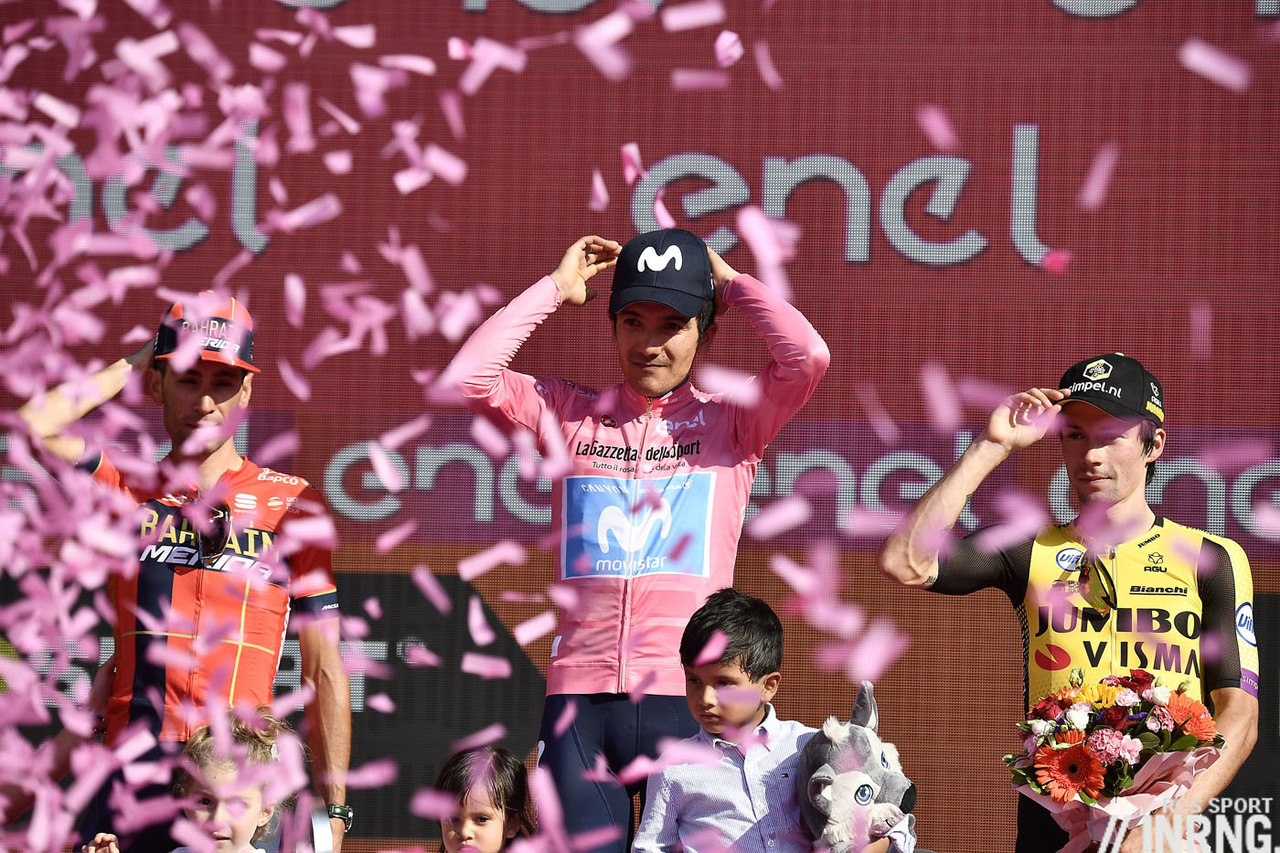
Movistar’s season is mixed. The glass half full scenario is they won a grand tour with Richard Carapaz and Nairo Quintana took stage wins in the Tour and Vuelta, while Alejandro Valverde won five times too including a Vuelta stage. The other version is Valverde’s win rate is finally starting to decline and they’ve rarely looked like the cohesive team of the past, while all along they’ve suffered an exodus of riders with Enric Mas coming in but with a lot of expectations. Put simply they’ve not won as much this year and next year looks even more challenging.
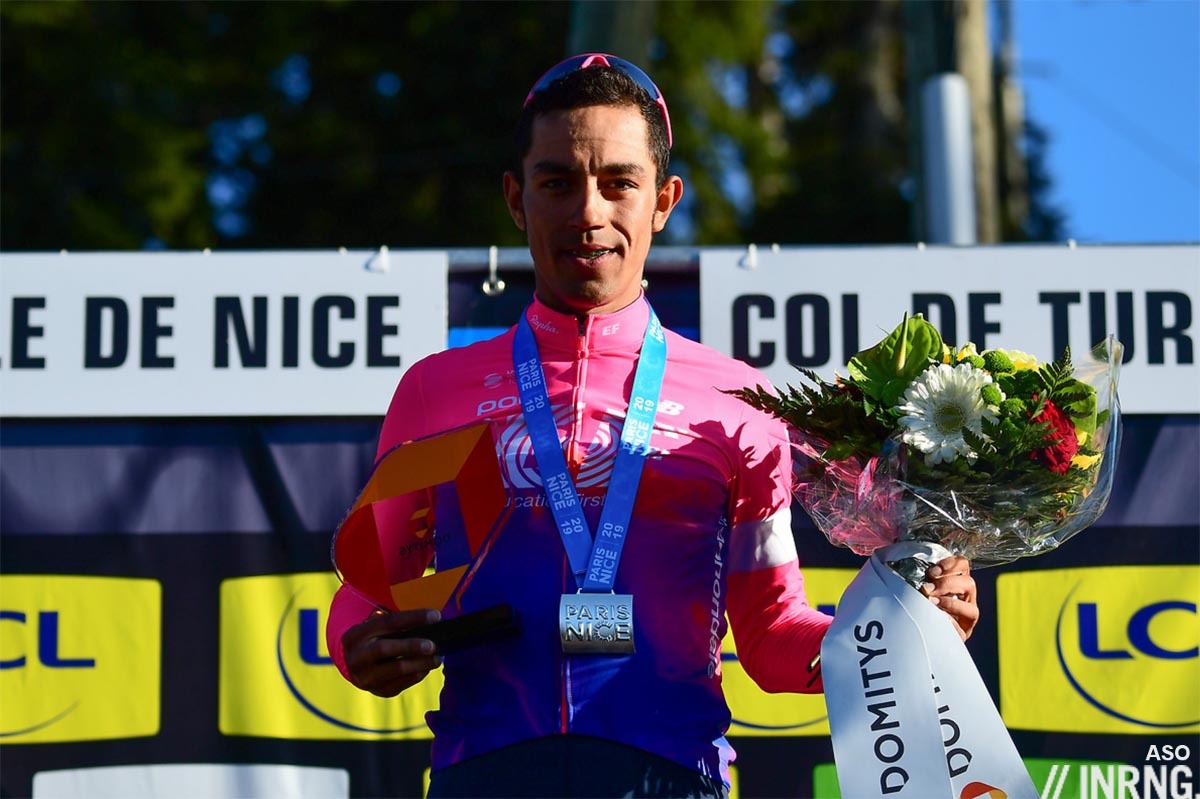
EF Education First had a tidy season, except for the Tour de France. Alberto Bettiol took a huge win in the Tour of Flanders, Hugh Carthy’s Tour de Suisse raid impressed and they had useful wins like Dani Martinez in Paris-Nice, Michael Woods in Milano-Torino and Sergio Higuita’s Vuelta stage win, plus Sep Vanmarcke won his first World Tour race aged 31 in the GP Plouay. They tried sprinting with Dan McClay and Sasha Modolo but both are leaving and in come younger riders like Kristoffer Halvorsen, Stefan Bisseger and Magnus Cort Nielsen.
Bahrain-Merida underwhelmed both in terms of quantity and quality, their budget ought to deliver more than 16 wins. Still Vincenzo Nibali was in the limelight for his Giro bid and if he was “encouraged” to ride the Tour de France he delivered a consolation stage win on the last mountain stage after Dylan Teuns had landed a big win on the Planche des Belles Filles.
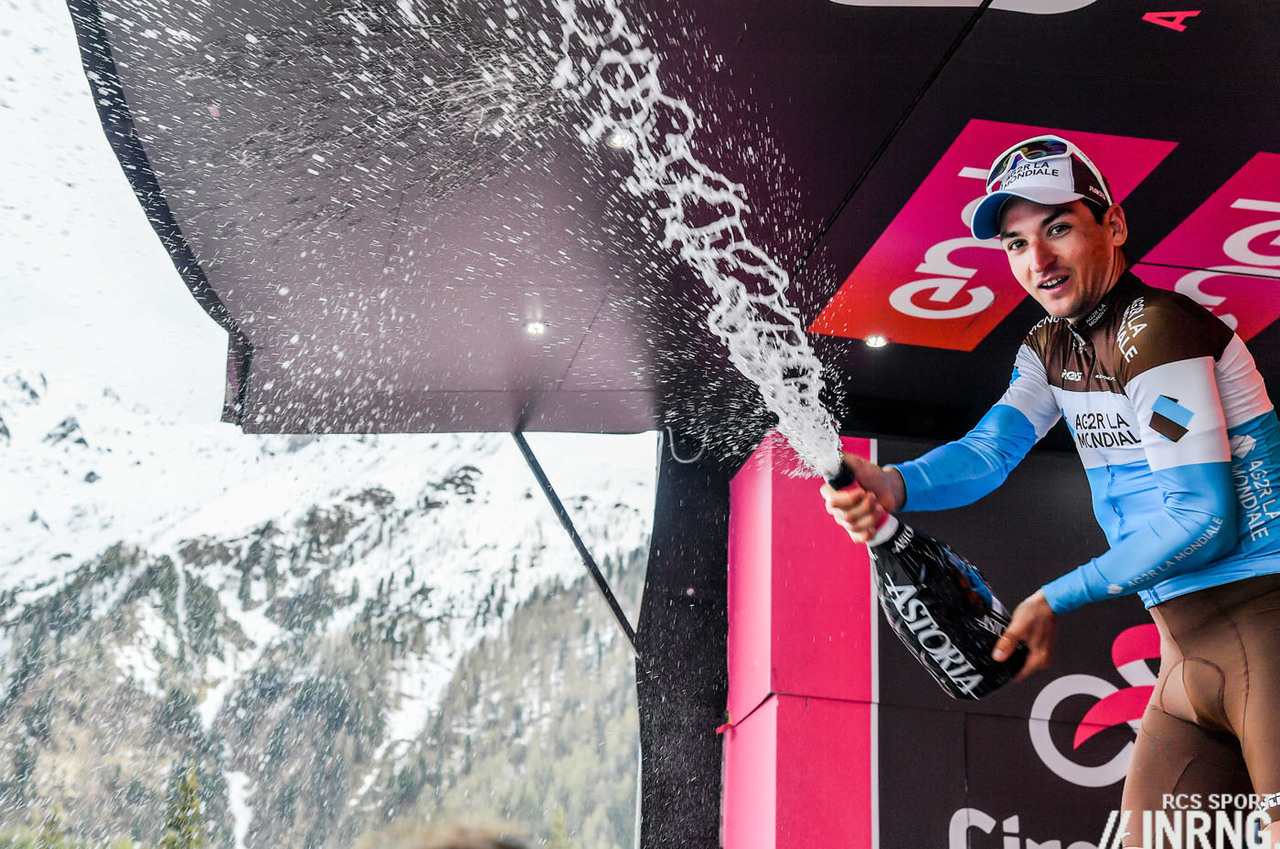
Ag2r La Mondiale’s season will probably be defined by Romain’s Bardet’s struggles, a little off the pace in the early season and never got back to his top form, still he collected the Tour’s mountain jersey. I can’t find the tweet or quote from Cillian Kelly but last year the team were in more breakaways than any other World Tour team but given most breakaways are doomed this helps explain the lack of wins. To compound things they lack an effective house sprinter. Pierre Latour also had a season to forget after breaking his arm in the spring. Benoît Cosnefroy was their top rider with five wins and one to watch in 2020. They had the joint lowest rate of World Tour wins with two wins out of 14 with Nans Peters winning a stage of the Giro and Oliver Naesen taking a stage of the BinckBank Tour (Dimension Data got one out of seven).
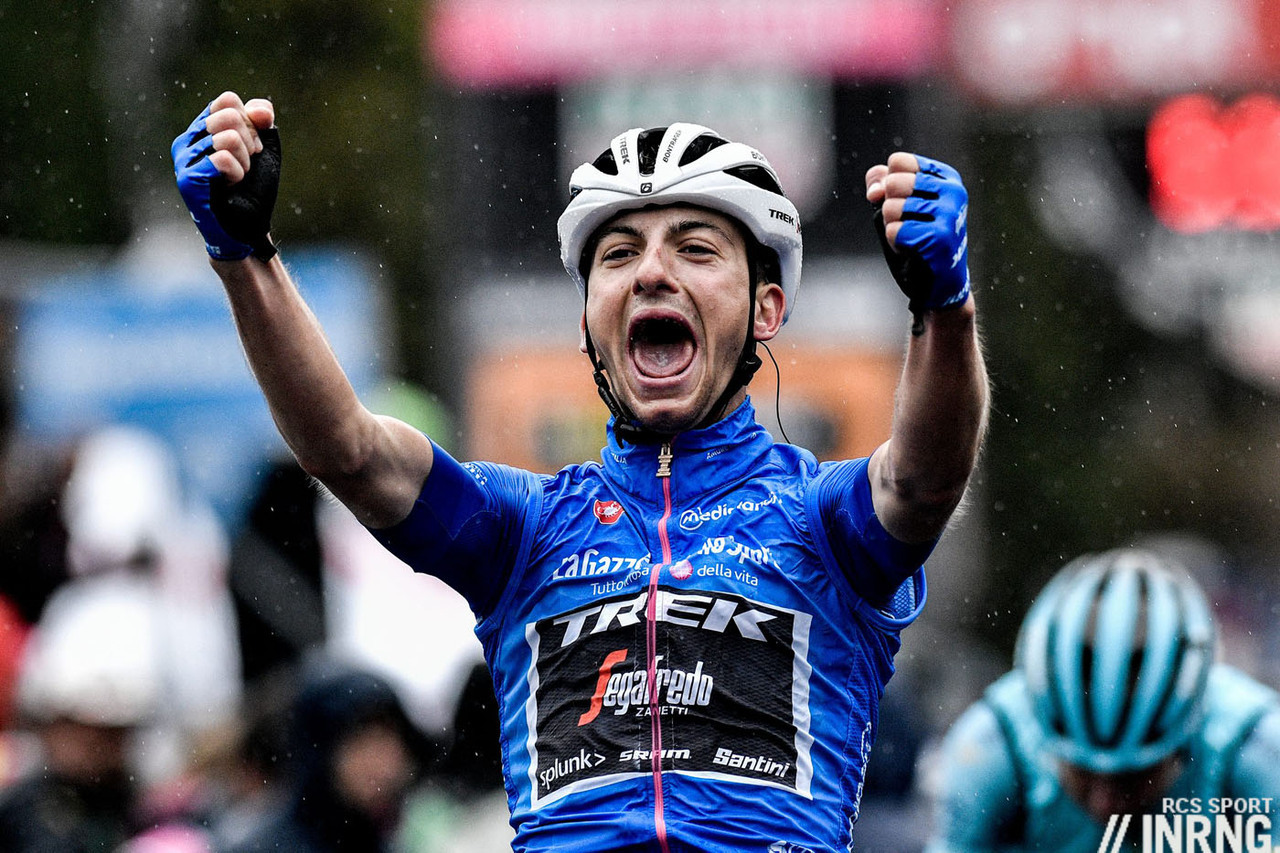
Trek-Segafredo’s big signing was Richie Porte who started the season with his habitual win on Willunga but then nothing went to plan for the Tasmanian, usually a sure-fire rider for one week stage races. The Segafredo side of the sponsorship should still be purring thanks to Giulio Ciccone’s Giro – a stage and the mountains jersey – and Bauke Mollema’s Lombardia win.
Team Sunweb were supposed to win a grand tour and more only they end the season with more reconstruction work ahead than Movistar. They’ve never been copious winners in recent years preferring to focus on Tom Dumoulin’s grand tour bids which proved useful but now he’s left and exposed their reliance on him. He crashed in the Giro and this began an odd time for him where he started the next stage despite being unable to pedal and then lined up in the Dauphiné despite reports of a metal shard in his knee (it turned out to be a stone) and by July he was negotiating his exit from the team. Michael Matthews delivered three World Tour wins while Cees Bol points the way for the future, a neo-pro he scored three wins and they’ll be the youngest squad in 2020 by some way.
Dimension Data have had a poor season but they’re not a big budget outfit – I gather riders paid to make their own pre-season training camp. The season started with promise when Edvald Boasson Hagen won the time trial stage of the Tour of Valencia but they ended with only one World Tour win. However was winning the goal? Surely yes but they’ve been points hunting too and managed to avoid being ejected from the World Tour by just a handful of UCI points and so perhaps harvesting points counted for more than audacious bids for victory.
Two years ago as BMC the team finished second but plenty has changed. CCC started well with Paddy Bevin in the Tour Down Under but the momentum never got going. Greg Van Avermaet’s still a valuable rider but more the Van Avermaet of old, a factor in the spring classics but not a victor and he collected a useful World Tour win for the team in Canada. New signing Matteo Trentin should help in 2020.
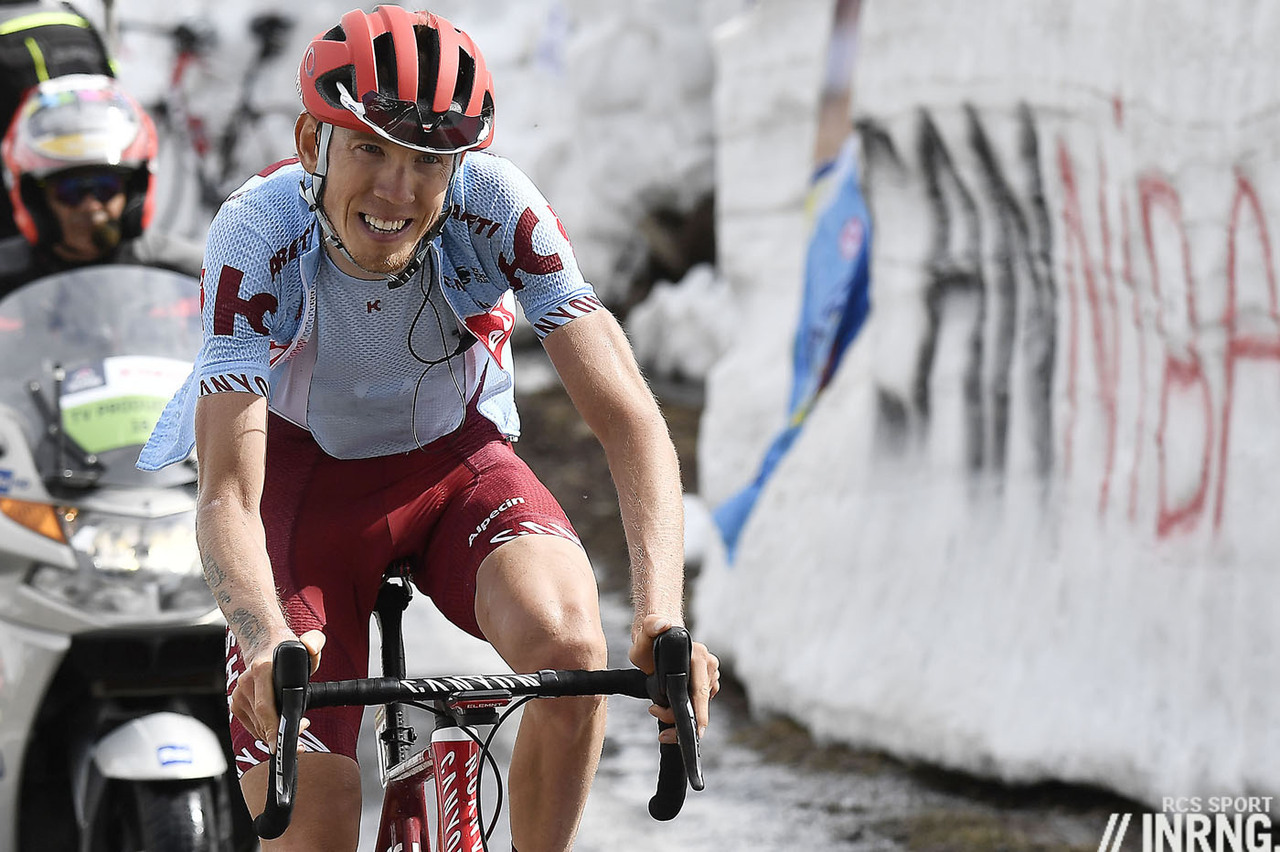
Once a giant budget supersquad targeting classics and grand tours alike Katusha-Alpecin saw the wheels come off in 2019. Marcel Kittel started with a win in Majorca in February but ended up leaving the team in May. Ilnur Zakarin took a big stage win in the Giro on the slopes of the Nivolet but only after his GC bid had come to an end and perhaps their most exciting result was Nils Politt’s second place in Roubaix? Sponsor Alpecin pulled out, whispers about team owner Igor Makarov reducing his expenditure went public and the season finished with remnants of squad being scooped up by the Israel Cycling Academy.
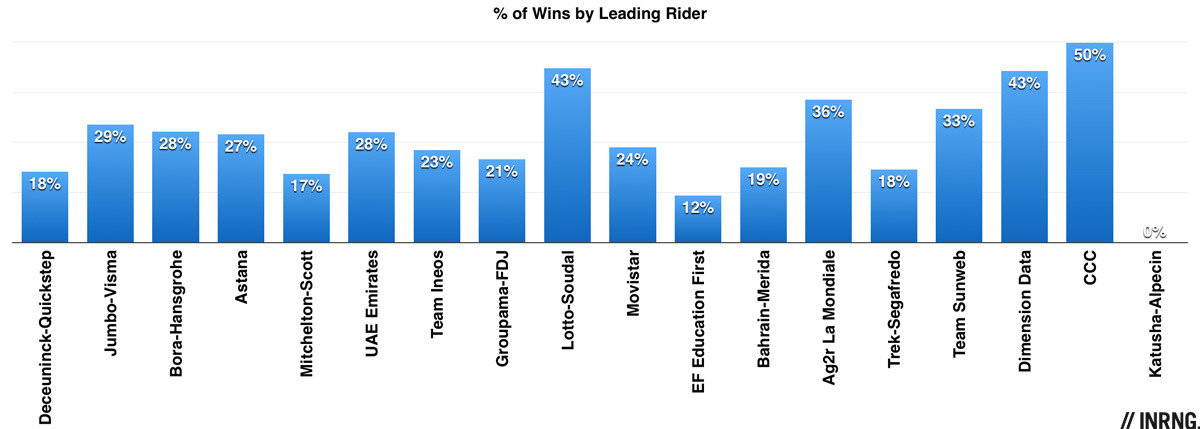
Now for a bit more detail around the numbers. This chart above shows how dependent a team is on one rider for their wins. Only it’s less useful this year as several squads have seen riders tied for wins. Still it demonstrates Deceuninck-Quickstep as the team that wins a lot and a lot of them win; Jumbo-Visma aren’t reliant on Dylan Groenewegen. Lotto-Soudal stand out as being reliant on Caleb Ewan.
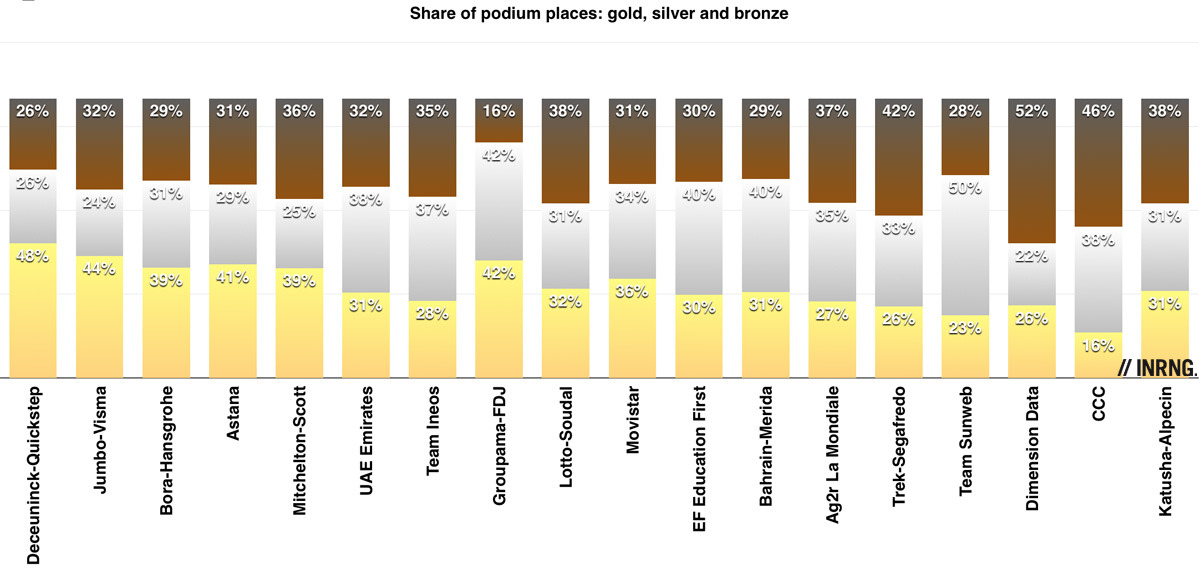
This chart shows the distribution of podium places with gold for the win, silver for second and bronze for third. Deceuninck-Quickstep again beat the odds with almost half of their “podium finishes” being wins when a normal distribution ought to be one third each. It means that if you see a Quick Step rider coming to the finish there’s a strong chance they’ll convert this into a win and this is something observed over the years now, it’s not a statistical oddity. These 18 World Tour teams shouldn’t have a perfect 33-33-33 ratio because they against weaker Pro Conti and Conti teams from time to time and Groupama-FDJ point the way, they racked up plenty of .HC and .1 races against smaller teams. Dimension Data’s chances are almost the inverse of Quickstep, if they’ve got a shot at a top-3 then chances are they land third, albeit from a smaller sample of 37 opportunities all season; CCC’s chart reads frustration, six wins but 14 second places.
- Methodology: wins are in *.1 races and above and when the rider is wearing riding for their team, eg Mads Pedersen’s Worlds win is not a triumph for Trek-Segafredo; nor Yevgeniy Gidich’s win in the Asian cycling championships as he was riding for the Kazakh national team rather than Astana etc. Put simply wins count for a team when a rider is wearing their jersey. Ancillary prizes like points competitions, mountains jerseys don’t count.

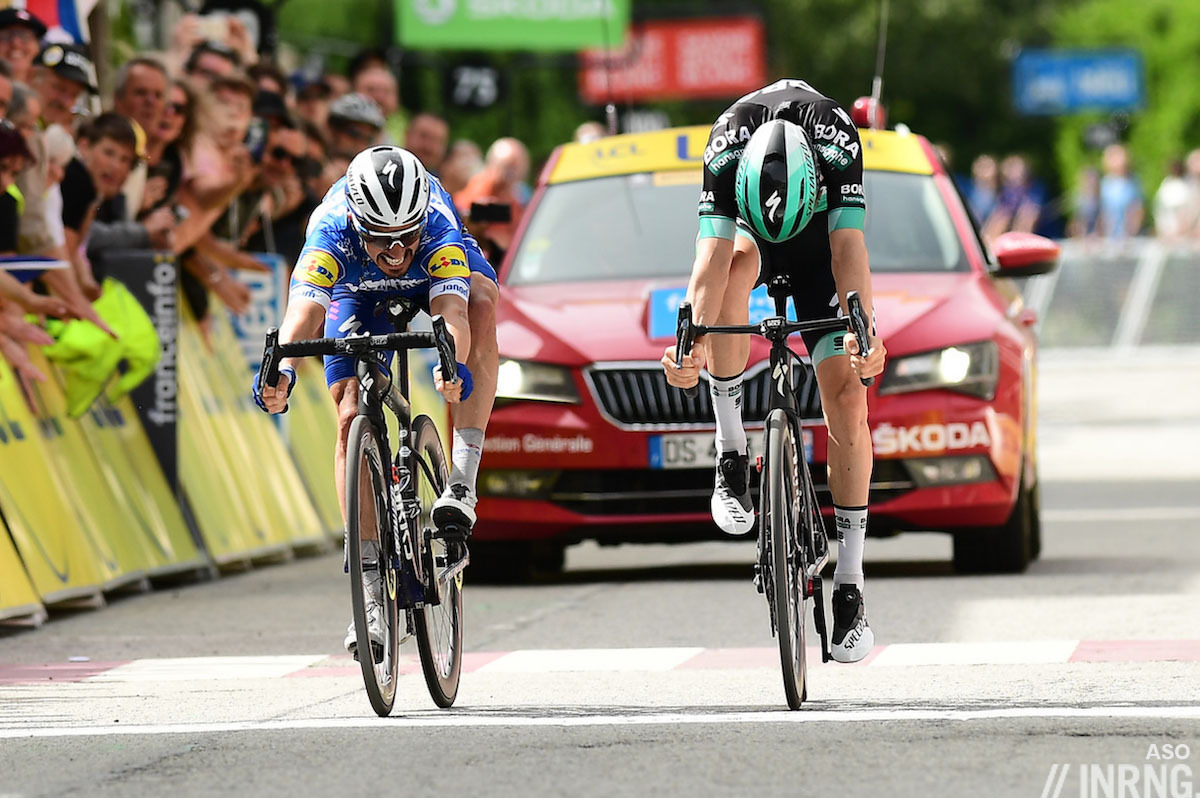
“ Sep Vanmarcke won his first World Tour race aged 31”
Amazed at that!
DD and SunWeb show how quickly things can change, it doesn’t feel long since Cummings and Cavendish were pulling in loads of wins, or Matthews and Barguil were ripping it up at the TdF.
Isn’t Omloop Het Nieuwsblad a world tour race?
In 2012 (when Sepp Vanmarcke memorably won) it wasn’t.
“Sinds 2005 maakte de wedstrijd deel uit van het Europese continentale wielercircuit. Vanaf 2017 maakt de wedstrijd deel uit van de UCI World Tour. “
Thanks for the explanation.
Nice wrap up of the season from the team perspective. This was my first year of closely following cycling races throughout the season, and this is a nice look back. It’s interesting to see the news that Hema as a potential sponsor of Jumbo Visma – Jumbos and Hemas are ubiquitous here in Amsterdam, and it seems like a case of the team success pulling in another big sponsor, which will help then sign/keep big riders, continuing the cycle till they have some off years. I’ve been surprised at how important the TdF is for many Dutch casual cycling fans, and how big a star Dumoulin is compared to other top Dutch riders. And here’s hoping the Hema addition might lead to better looking kit!
It’s now been two full seasons with David Lappartient at the UCI helm. Would love to see your overall thoughts and observations of how he’s and the UCI are doing, both relative to what Cookson was doing, as well as on his own merits. It’s seems like a very mixed performance, which isn’t surprising given what I know about the divisive way he apparently operated behind the scenes leading up to his election.
I hope you don’t mind me interceding and passing on my two penno’worth as a British cycling fan.
But I feel that Lappartient was brought to power on an anti-Sky agenda in particular and ergo a broadly anti-British one too.
The Froome salbutamol case and the information leaks occurred quite quickly thereafter.
Lappartient gives off a populist vibe; the reduction in team race sizes has diluted power to the strongest teams and DQS are the best example of this.
The tinkering was arguably brought in to affect the Sky train and had no effect whatsoever. The tactic was always a legitimate one, employed to make the most of Chris Froome’s particular strengths and mindset.
We’ve seen this year that Froome’s absence influenced the Tour more than any UCI-led change to the rules could ever do.
The gods of cycling – weather and injury – will always be in control and I just wish that the UCI (and tub-beating fans) would realise this and leave well alone.
The teams / Velon and the UCI continues to be somewhat at loggerheads and, as the figure head, Lappartient is responsible for this.
I’m not a UCI-basher, the sport relies on their staff and volunteers, for whom I have the upmost regard.
*concentrated* not diluted
I was about to agree with what you wrote until a) I thought of the current Freeman scandal emerging into the mainstream b) “The gods of cycling – weather and injury – will always be in control” leaves out money, which I don’t think even the most die-hard, jingoistic British cycling fan would suggest is just a coincidence when related to the SKY/INEOS success over the years c) blaming the current UCI prez for Velon’s ridiculous lawsuit when those MBA “genius” types made just as much nonsensical noise during the Cookson regime.
Finally I need to ask KevinK: Is what I wrote above “trolling”? If so, the folks who post here along with Mr. Inrng can “vote me off the island” never to be heard from again.
Larry, please don’t do that! I may not always agree with you, but I always enjoy reading your take on things.
We all troll sometimes. I wouldn’t worry about it.
I’ve never considered Larry a troll. A curmudgeon, sure, along with how many others? I’ve always enjoyed his historical tidbits and appreciate his love of classic cycling.
Trolling is a much abused term. My understanding is that you write an anonymous post which is meant to abuse or disparage in some way or another. Basically an out pouring of bile which is facilitated by the persons anonymity (i.e. if they truly were accountable for such bilge they would not post). Larry, you may let forth the bile, but you are at least accountable……;-)
This interview from Velonews adds a bit of insight to Lappartient’s reign – https://www.velonews.com/2019/10/news/the-outer-line-qa-with-mike-plant-on-lappartient-aso-and-pro-cyclings-governance-challenges_502374
I read that. I have to consider the source on that one as Mr. Plant is one of those people I wouldn’t trust any further than I could throw him. IMHO he was the perfect guy to work with someone like Donald J. Trump.
Interesting link. In my mind Cookson tarnished his legacy somewhat when he called for sky’s reputation to be reinstated.
https://www.cyclingnews.com/news/brian-cookson-calls-for-wiggins-reputation-to-be-reinstated/
Without that, the Plant interview would carry more weight (my opinion only).
The UCI electorate is very different to the people who are interested in road cycling, to get elected you need to get the national federations supporting you and most are not that bothered by pro men’s cycling, and why should the Brazilian, Thai or Egyptian federation be interested in Team Sky?
I don’t know the extent of things but one link to road cycling was Cookson’s deal with Wanda where he cut a deal with this private company to effectively outsource Chinese cycling, they run the Guanxi Tour and also were supposed to open a satellite of the World Cycling Centre and more. Other federations didn’t like the idea of seeing a federation bypassed and this swung some voters to Lappartient’s camp, how many isn’t clear.
I’m not sure what’s going on now, things look messy but there have been some good advances on the road side, eg the tramadol ban, the introduction of regulation for the Women’s World Tour and hopefully the cortisone controls come too. But much of this is progress that anyone should do rather than Lappartient, Cookson was exploring them too. But overall remember the UCI is a mid-sized organisation run out of an office on the edge of a small retail park in rural Switzerland, when people say “the UCI should do this” and “the UCI should do not” they often overestimate its power and competence.
I’m sure there’s an innocent explanation but “edge of a small retail park in rural Switzerland” is slightly concerning. To a hardened cynic it sounds like the white collar version of altitude training camps.
The point is it’s not in a city with the media, sponsors, rider union, manufacturers and ASO, RCS etc all a short walk away. It’s outside of Aigle, a small town known for wine and pickled gherkins, but this allowed the UCI to open an HQ with a velodrome.
I do wonder why the UCI, on a limited budget, are located in one of the most expensive countries in the world in terms of occupancy and staffing costs? Would it not make sense to relocate the entire operation elsewhere?
There’s a big network effect with all the sports bodies nearby, the IOC, sports lawyers, the CAS, a ready pool of staff. Plus Switzerland gives non-profit bodies like the UCI, the United Nations etc a special tax status which helps.
Places like Dubai are trying to appeal to sports governing bodies but haven’t attracted many so far despite offering a lot of incentives.
Thanks for the perspective. Your insights and balance are always appreciated.
The tramadol ban is sensible if the reports on its effects and overuse in cycling are accurate. Has anybody seen any benefit from the ban in this year’s races?
Do you mean things like fewer crashes? Fewer riders needing rehab?
It’s hard to prove. The obvious side is riders don’t feel compelled to use it which is good but it’s difficult to work out if performances have changed, to separate dips in form from random moments etc.
I’m not sure if your take on the Sky train is correct- we certainly didn’t see INEOS take full command of the peloton and halt attacks on the first summit finish as we had in recent years- FDJ were able to take command of the peloton on Stage 6, and they looked outright weak on occasion at Tourmalet and Foix Prat d’Albis- certainly not due to fatigue. This may have had something to do with Froome’s absence, but there were a lot of observations that some of their key mountain domestiques were seemingly off-form.
(of course, this is apart from the conspiracy theory that this was due to the AICAR bidon tip-off around that time…)
Movistar need some talent recruitment in the DS department even more than they do new riders, save for the Giro this year their tactics are either rubbish or non-existent, and lately they’ve mostly been cruising on a few high profile wins from the likes of Valverde and Quintana.
I can’t imagine too many cycling fans mourning the loss of Katusha from the peloton, but they had some great riders in their time, Rodreguiez and Kristoff especially.
DQS’ total of wins was slightly down on the 73 achieved in 2018, the slight dip probably being down to Viviani’s loss of form this year., though still remarkably consistent.
The Italian sprinter achieved 10 wins out of 22 podium placings, for a win average of 45%.
Very decent, and in line with that of his team’s performance as a whole, but this did not include a single win in the two Grand Tours he participated in 2019.
Of particular disappointment must have been his near misses in the Giro.
Perhaps there was a back story to his season and subsequent move to Cofidis for 2020?
In contrast, Groenewegen hit a 60% win rate in his 25 podium placings and was probably the dominant sprinter of the season. His excellent lead out train must also take credit.
Whilst the Dutchman’s, and Roglic’s, wins accounted for nearly 60% of JV’s team victories in 2019, their team is a wonderfully balanced one .
It will be interesting to see if Dumoulin’s addition adds to this strength or possibly upsets or dilutes it?
Finally, Caleb Ewan posted a 40% win rate in his 25 podiums.
But it was an excellent season and, I think, a break through one where he really cemented his place as a top quick man and fulfilled his potential.
It’s a difficult pick to name the best sprinter, usually there’s an established pecking order. Was Groenewegen the best? Maybe but Ewan got the better of him in the Tour and Ewan got the better of Viviani in the Giro too.
Definitely not a clear sprinter pecking order this year. Ackermann had an even better Giro than Ewan, took 13 wins (3 more than Ewan), and scored a lot more points than Groenewegen. Bennett had 11 WT wins among his 13 victories, which I think was the most WT wins for a sprinter. He also dominated Ewan at Paris-Nice, though as we all know he didn’t get a chance to test himself against these guys on the big stage. For my money, Groenewegen had too many low quality wins to be considered top dog.
The Trentin/van Avarmaet dynamic at CCC next season could be quite interesting. History suggests Golden Greg isn’t the best at sharing his team with another top rider. I wonder if he’s an only child?! It’s interesting also that the Quick Step steam roller has kept on going despite the loss of several top riders over the last few years. Injuries to Alaphilippe and Bennet next year could put a serious dint in that total. A cobbles team of Stybar, Lampaert, Asgreen and Senechal seems significantly less intimidating than the Boonen, Gilbert, Terpstra, Trentin, Stybar of not so long ago.
As you say it’ll be an interesting tandem, I suspect both Trentin and GVA will be keen to get up the road before the other attacks. GVA’s not an only child, his sister Claudia’s a minor celebrity fitness instructor in Belgium and married to ex-pro Rik Verbrugghe, the Belgian selector and formerly of BMC, IAM and Bahrain-Merida management.
A niggling pet peeve: “Kazakhs” are an ethnic group, while people from Kazakhstan are Kazakhstanis. Not all people from Indianapolis are Indians, and the ones that are probably don’t really like sharing the name with those that aren’t.
Fair point, noted for the future.
Wonderful work 🙂
Note to BC: ‘The Beast, the Emperor and the Milkman’ by a dour Yorkshiremen with a wonderful sense of humour. Harry Pearson. Pub: Bloomsbury: ISBN HB 978-1-4729-4504-4.
was a very enjoyable read, despite the fact I didn’t get all the references to UK pop-culture.
Having been up there to see a few of these events myself, I can attest to his descriptions being spot-on. Thanks again for the recommendation!!!
Harry Pearson’s entire body of work is a must-read, in particular The Far Corner, billed as “a mazy dribble through North East football.”
I suspect though that Pearson would baulk at the accusation he’s a Yorkshireman. Middlesborough might ceremonially be part of North Yorkshire but philosophically and emotionally the connection is more with Teesside. He’s a Smoggie!
Glad you enjoyed it – some thought provoking history about the popularity of our sport come out on second reading !